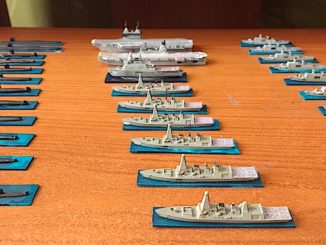November 1963
Last week I invited Puffins to guess, in unread comments below the unread article, what course my father’s cousin Anne may have plotted when, aged only 26, she lost both of her parents in the winter of 1963. As a well-educated young woman at the start of the swinging 60s, living within an easy commute of London (Chatham) and with an inheritance of £3,500 – a reasonable sum of money in those days – where did life’s fair winds and following sea take her next?
Puffins reckoned she may have become a go-go dancer or perhaps something big in tin pan alley. No and no, but I’ll wager she may have mixed with stars of stage and pop all the same. Let me explain. I want Puffins to picture a scene away from the tin bashing, clattering and banging of her Medway town’s Royal Navy Dockyard and the tight Victorian terraces of her Kentish early adulthood. It is the countryside but not for much longer. We are eavesdropping upon an interview in a Nissan hut. A chap with a handlebar moustache sits opposite my father’s cousin, an attractive well-spoken young lady in her mid-twenties. Outside, in great haste, diggers and mixers lay concrete by the mile.
‘The thing is, Miss Black, London’s jolly expensive.’
‘I have an inheritance, Sir, I can take rooms in Ealing, a short hop away on the bus. If they ever extend the Picadilly line, it’ll be easier still. ‘
‘Very well, tell me about your childhood.’
‘We were overseas, Sir, my father was in the Senior Service stationed in Malta and Gib. When not swimming, or running wild and free under an idyllic southern European sun, I was receiving a strict traditional grammar school education taught by the nuns. On weekends, would visit the Archaeological Museum in Seville or stay in a Parador in rural Andalusia with my visiting cousin.’
‘You’re hired! Welcome to the team!’
The team was the British Overseas Airways Corporation and Anne travelled the world as an air hostess. She developed a love of East and Southern Africa, particularly Northern and Southern Rhodesia and South Africa itself, long before the catastrophe of majority rule was forced upon the Bantu. As well as travelling there for work, empty last-minute seats were sold to employees for pennies meaning she could also holiday there with her husband. Yes, husband.
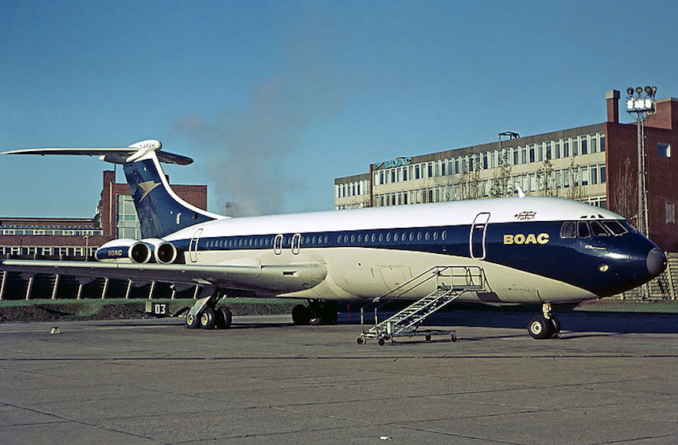
British Overseas Airways Corporation (BOAC) Vickers VC-10,
Steve Fitzgerald – Licence CGNU Free Documentation Licence 1.2
Her husband was part of the team too, a BOAC purser. To my chagrin, I can’t remember his name. He should have been called ‘Dickie’ as, in a Dickie Davies lookalike tie-break, the real Dickie Davies would not only have lost but have been de-bagged, laughed out of the village hall, kicked down Lover’s Lane and thrown into the Solent.
The Purser
What does a purser actually do? We shall ask a retired one. Step forward and take another bow, Mr Dickie Davies. Every interviewer’s dream, the former ITV Saturday afternoon sports supremo was back before the cameras of ITV Meridan in 2013 to commemorate the 175th anniversary of the south coast-based Cunard shipping line.
“A purser looks after the purse, in many ways,” he told the Meridian Tonight anchors Sangeeta Bhabra and a guy in a silver toupe, “Looks after the documents. Looks after immigration and customs, and entertains the passengers.”
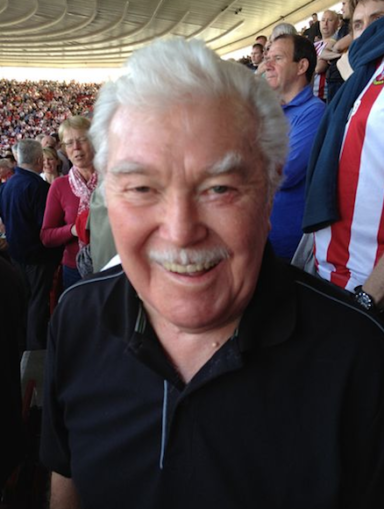
Dickie Davies at St Marys Southampton,
Hrse12 – Licence CC BY-SA 4.0
After leaving the RAF in 1946, Wirral grammar school boy Dickie joined the Cunard line in nearby Liverpool and worked the trans-Atlantic route on the Brittanic. In 1953 he headed south and transferred to the Queen Mary, working out of Southampton. By now a Senior Assistant Pursor, he joined ‘Top Office’, responsible for the first class passengers, including the likes of the ‘amazing’ Noel Coward. One evening, stumped for entertainment, Dickie asked the lounge if a volunteer might play the piano. A chap called Duke Ellington raised his hand and was happy to oblige.
Now aged 89, Winchester resident Mr Davies is still about the place and is occasionally spotted at Southampton FC home matches where he’s purseresquely slightly too keen to pose for selfies and chat with fans.
A Golden Age of Air Travel
Having established that pursers aren’t born but factory-built to an exacting template, we will imagine Anne and her husband at the expensive end of a southbound VC-10 entertaining gentlemen cricketers, tribal chiefs, the occasional pop star, a district commissioner or three and Alan Whicker.
Your humble reviewer of photos just about scraped into the tail end of the golden age of air travel, albeit to the Far East, Gulf and Indian Subcontinent, rather than southern and eastern Africa. With none of this nonsense about direct flights, journeys took days rather than hours. There were stopovers, refuellings, changes of plane and unexpected detours. On more than one occasion, sheep and goats were accommodated behind the smokers. After takeoff, total strangers had time to take an interest in each other, swap life stories, fall in love, become engaged, take each other for granted and call everything off – all before having their passports stamped again.
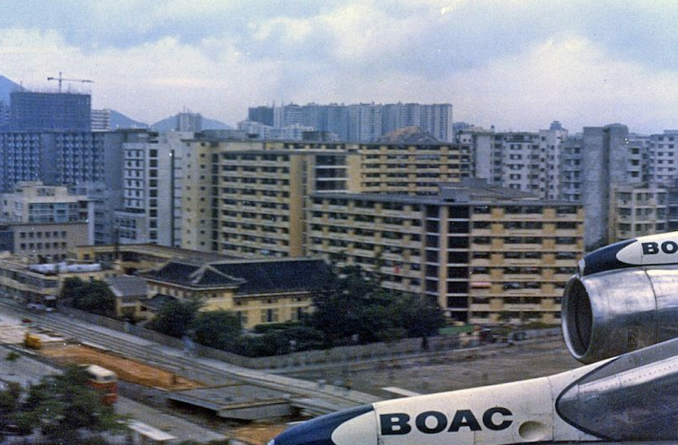
BOAC Boeing 707 on finals into Kai Tak,
Clint Groves – Licence GNU Free Documentation Licence 1.2
On approaching Hong Kong’s Kai Tak, Kowloon Mall roof was tyre tred scappingly too close to a lowering undercarriage. At Singapore’s Changi, children sitting outside their nipa hut classrooms were a bit too near to the runway. What looked like allotments spilling onto the tarmac at New Delhi turned out to be homes for families of ten – in the nicest part of town. Walking across a baking hot apron following a nighttime arrival in Manila, one once fell into an old trench dug by the Japanese army. Better times.
We shall assume something similar for Anne and her husband, albeit in a different direction. Looking through some old timetables, quarter to nine at night on a Tuesday saw a VC-10 strike out from London Airport for Jo’berg. A midnight stop in Rome allowed long enough for a wander around the outside of the plane and consumption of half a packet of Capstan Full Strength. On to Nairobi, with time to spare for an overenergetic gentleman to rattle a native girls’ nearby tin hut’s roof. Arrival in Johannesburg was at noon. A cad jumping the taxi queue might make Carlos Coffee Shop in time for tiffin (or was that Port Elizabeth?).
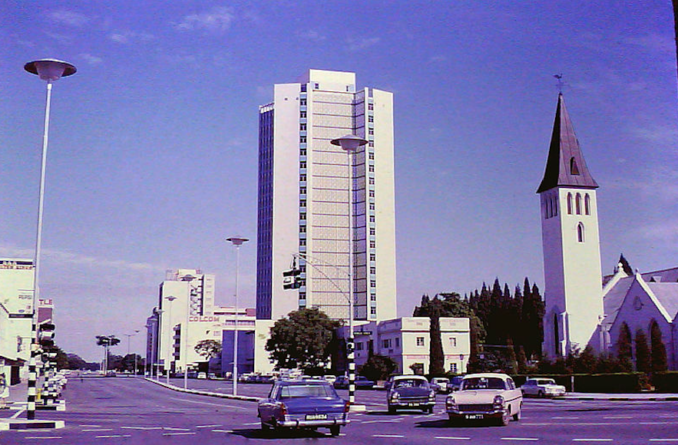
Jameson Avenue in Salisbury, 1970s,
Rob – Licence CC BY-SA 2.0
The only way to get to Salisbury was by 707. Yuk. Likewise Windhoek where, in those different times, even the black Namibians were still naming their children after Adolf Hitler.
Most of the services terminating in East Africa were by Comet. Eek.
There was a Thursday VC-10 service leaving London Airport at five to seven in the evening for Ndola and Luanda which terminated in Lusaka in time for Friday breakfast. If you don’t know where these places are, you never sat beside a chap at school doing maths and geology in anticipation of inheriting a mine in the Zambian copper belt. Meanwhile, the quarter past six Monday evening service went to Aden via Tripoli and Khartoum. We shall assume this to be the other Tripoli, the one lying 50 miles north of Beirut on the Lebanese coast.
As for the nibbles, I fell across a menu for the London – Rome – Khartoum – Nairobi route. Within a card cover decorated by gold cord and tassel, not much is offered to the vegetarian apart from wild Kenya strawberries. I would have plumped for the grilled fillet steak maître d’hôtel, buttered French beans and rissolées potatoes but passed on the complimentary English or American cigarettes.
If slightly younger Puffins (perhaps reading this on their mobile device while standing in an endless queue in an airport car park) find this difficult to believe, here’s the proof.
On the subject of Southern Africa, airports and the heavy hint that things were better in the old days, if you’re sat before the computer in a kevlar vest you might want to risk clicking on this link and having a look around the present day’s Airport Road in Eastern Cape city of East London. Dear God.
Journey’s End?
As we discovered last week, Anne was to die in 1992. She left a husband but no children. A month later my father’s other remaining cousin on that side of the family, Jack, died. You may recall it was Jack who was engaged (to another Anne) for decades but never married. Again, there were no children. Even Puffins with the most rudimentary knowledge of psychology will have realised by now that this humble teller of tall tales is an only child. Readers may remember from last time that my father died in 1997. Therefore, not only am I king of the Worth-Sayings but I am celebrating my silver jubilee. Flicking through television channels a couple of months ago I noticed a London fly past, military parade and evening concert. Was I supposed to be there? Never mind.
You might think, with everybody being dead and mention in recent episodes of ‘journeys end’, now might be a fitting conclusion to the Nostalgia Album series. Not so. Having travelled from Carlisle to Gibraltar by Ford 8 for a 1950s family reunion with Anne and her parents (via Biarritz, San Sebastian and a string of one-horse towns north and south of Madrid), my father and grandparents returned to Blighty by a different route. On the way, they continued taking photographs.
See them next time on Nostaliga Album!
© Always Worth Saying 2022



